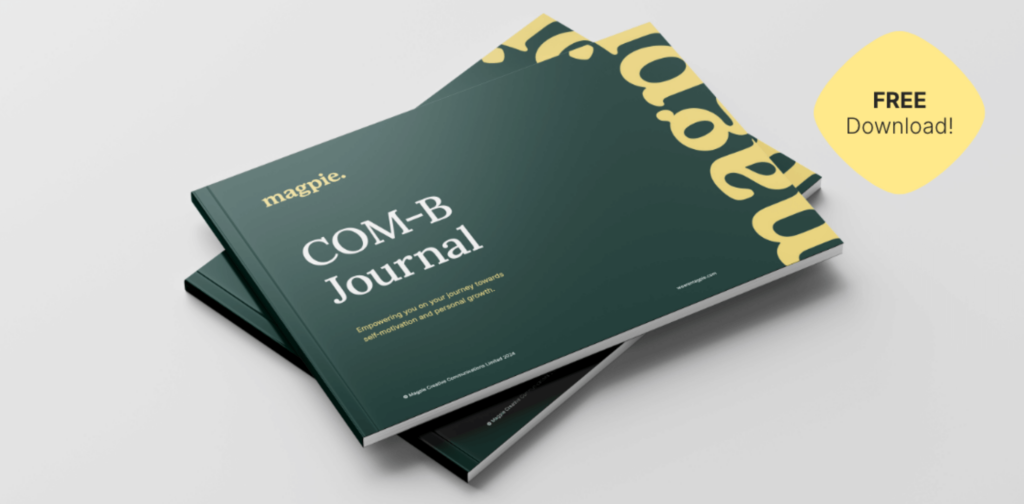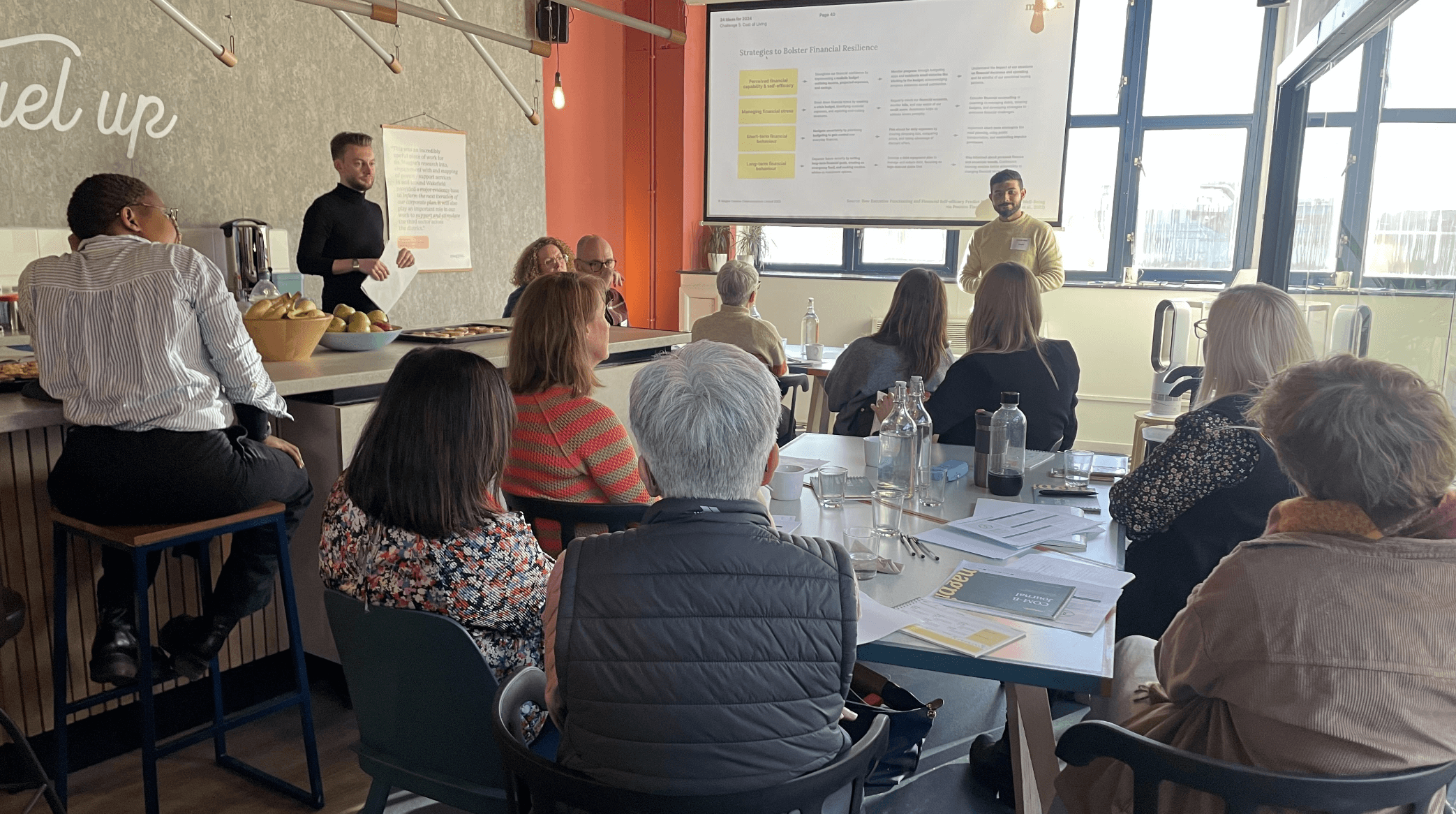Last month we were thrilled to be joined by fellow change-makers from our client community to unlock 6 of the 24 challenges for 2024 and generate positive solutions and ideas to kick off the new year. Here are some of our key findings from the day:
Challenge 1: Generating effective ideas with limited time
Idea 1: The one-minute brief – a tool for rapid collaboration and problem-solving
This is a really helpful creative exercise we use for ideation and collaboration with the team. It can be used as a way to gain early ideas and different perspectives on any type of brief/challenge (be it a creative, business, strategic or culture based). Here is how you can use it in your team meetings:
- Introduce the brief and objectives to your team
- Offer an opportunity for questions/discussions
- One-minute round one: Ask everyone to take one-minute and note down their ideas for this brief (without consulting with others) – this will generate independent ideas and thinking
- One-minute round two: Give everyone one-minute to share their ideas openly
- One-minute round three: Having heard everyone’s ideas openly, give everyone a further one-minute to evolve their ideas independently
- One-minute round four: Have a final round of sharing ideas (one-minute for each person)
- Finally – as a team discuss and prioritise the top three ideas you all agree are worth exploring further

Challenge 2: Finding motivation during times of adversity
Idea 2: Using behavioural science for self-motivation
At Magpie, we use the COM-B model to design our population-based behaviour change interventions. The COM-B model is the gold standard framework for understanding and unpacking behavioural antecedents. The model posits that three components (Capability, Opportunity and Motivation) influence behaviour, which accounts for all the factors outside the person that make a behaviour possible.
You can read more about the COM-B model and how we create effective campaigns here.
In this ‘24 ideas for 2024’ session, our researcher, Mirela Neto, explored the possibility of using the COM-B model for self-motivation, designing a unique COM-B journal for our attendees to use on behavioural challenges they wish to overcome.
It is with great pleasure, that we share the COM-B journal with you. Download it here.
Challenge 3: Communicating more effectively with the Voluntary, Community, Faith and Social Enterprise (VCFSE) sectors
Idea 3: A toolkit for equitable communications with VCFSE leaders
With restrictive budgets and the need to collaborate more effectively across target populations in order to get projects off the ground and campaigns in action, we understand it’s more important than ever to understand and value working relationships within the VCFSE sectors.
Magpie’s cofounder, Ged Savva, shared a toolkit created for Wakefield Council and Yorkshire Sport as part of a project designed to work collaboratively to launch active lifestyle campaigns. This involved understanding the dominant personality traits found within leaders across the VCFSE sectors and resulted in a personas toolkit created to understand the different leadership styles in order to communicate in a more equitable way.
We hope this toolkit helps you consider tailoring your engagement approach and communications across the sector.
Challenge 4: Leading across boundaries
Idea 4: The power of our common purpose
We were thrilled to be joined by Claire Bennett from Common Purpose at the in-person event last month. Common Purpose is a global not-for-profit leadership development programme made up of over 100,000 members including emerging and senior leaders in various organisations around the world.
Claire noted that so much professional time is spent driving social impact and leading teams to success. While this is hugely important, you might also spend some time exploring how the things that inspire and uplift you can help you in approaching the broader question – what is your purpose?
Activity with your teams:
In pairs or groups (or individual reflection) ask the following questions:
- What is your purpose?
- What brings you joy in your professional life?
- What brings you joy in your personal life?
In exploring the answers to these questions, we can begin to find the correlation between our ‘purpose’ and our ‘joy’. Perhaps they’re not so different after all!?
Challenge 5: Cost of living
Idea 5: Insights and strategies for financial resilience
With rising expenses outpacing income growth, millions of people are struggling to afford basic necessities. Financial resilience is the ability to withstand and recover from unexpected financial challenges. It involves equipping ourselves with the tools, knowledge, and confidence necessary to navigate financial hardships effectively.
While external (macroeconomic) contributing factors such as inflation, housing costs, and borrowing expenses pose significant challenges, internal (and trainable) psychological factors play a crucial role in determining our ability to navigate financial difficulties. Four key contributors from the Financial Wellbeing Framework by Fan and Henager (2021) – perceived financial capability (underpinned by self-efficacy), objective financial knowledge, financial stress, and short and long-term positive financial behaviours directly influence our financial well-being.
By focusing on enhancing our confidence in our finances and managing financial stress by taking action, we can strengthen our financial resilience and improve our financial satisfaction.
Some practical strategies include:
- Creating a monthly budget (involving a crisis budget) considering income and projected expenses, and exploring opportunities for cutting costs. It is important to monitor progress and celebrate smaller milestones
- Planning daily expenses by planning weekly meals, curating a shopping list beforehand, identifying emotional purchasing patterns and avoiding impulsive purchases.
- Regularly checking financial accounts, bills and credit score; creating a debt repayment plan to prioritise high-interest debts and consulting a financial counsellor if needed.
- Setting one’s long term financial goals and creating an emergency fund (six times the monthly budget or twice the monthly income).
Challenge 6: Competing for budgets and budget extensions
Idea 6: Using lived experience and community insights to provide ROI and impact
In order to compete for budgets and extensions, we need to ensure the work has real impact to prove the investment. Your audience is your biggest asset, from the start of your project, right to the end. Listen and understand ‘the problem’ from real life people and their perspective. Give confidence to your briefs and know what you are doing is the right thing, at the right time, and in the right way. Never rely on assumptions.
Enrich your evaluations – how did your work have true impact on your audience? We can draw on campaign metrics, but to truly show impact we need to hear from the audience. Give your evaluations ‘life’ and paint a human picture.
We explored different ways to engage with your audience – through surveys and feedback on social channels, to face to face interaction such as community events or capturing vox pops on the street. Be creative, and ensure all audience insight and interaction is accessible.
Get in touch if you are considering a brief and would like advice, community collaboration or lived-experience insights to make your next project more effective.
The next 24 Ideas event is taking place on Thursday 18 April, 11.00am – 2.30pm. Please email Christopher Hulme (christopher@wearemagpie.com) if you’re interested in attending.
